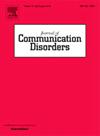Parental language mixing and its association with language outcomes of children with (a suspicion of) Developmental Language Disorder
IF 2.1
3区 医学
Q2 AUDIOLOGY & SPEECH-LANGUAGE PATHOLOGY
引用次数: 0
Abstract
Multilingual children naturally encounter language mixing in their environment. Since children’s language development depends on their language input, and processing language mixing in the input may be cognitively demanding, the amount of parental language mixing could affect children’s language outcomes. This matter is also highly relevant for children with developmental language disorder (DLD), who face challenges with language processing and uptake. We hypothesize that these children’s language difficulties may amplify any negative relationships between parental language mixing and the language outcomes of children with DLD. Using a combination of questionnaires, day-long audio recordings, and Bayesian hypothesis testing, we examined parental language mixing and its relationship with Dutch vocabulary and grammar outcomes in thirty 3- to 6-year-old multilingual children with (a suspicion of) DLD in the Netherlands. Analyses were controlled for overall exposure to Dutch, children’s age and parents’ education level. Contrary to our hypothesis, we found a positive, albeit modest, association between parental language mixing and children’s Dutch language outcomes. This suggests that language mixing in the input may not hinder majority language development in children with DLD. Replication and further research are needed to understand the broader implications of parental language mixing for multilingual development in children with DLD, also regarding their minority language outcomes.
父母语言混合及其与发展性语言障碍儿童(疑似)语言结果的关系
多语言儿童在他们的环境中自然会遇到语言混合。由于儿童的语言发展依赖于他们的语言输入,而在输入中处理语言混合可能需要认知上的要求,父母语言混合的数量可能会影响儿童的语言结果。这一问题也与患有发展性语言障碍(DLD)的儿童高度相关,他们面临语言处理和吸收的挑战。我们假设这些儿童的语言困难可能会放大父母语言混合与DLD儿童语言结果之间的任何负相关关系。采用问卷调查、全天录音和贝叶斯假设检验相结合的方法,我们研究了荷兰33至6岁多语种(疑似)DLD儿童的父母语言混合及其与荷兰语词汇和语法结果的关系。分析控制了总体接触荷兰语、儿童年龄和父母教育水平。与我们的假设相反,我们发现父母的语言混合与孩子的荷兰语成绩之间存在着积极的联系,尽管这种联系并不明显。这表明输入中的语言混合可能不会阻碍DLD儿童的多数语言发展。需要进行复制和进一步的研究,以了解父母语言混合对DLD儿童多语言发展的更广泛影响,以及对他们的少数语言结果的影响。
本文章由计算机程序翻译,如有差异,请以英文原文为准。
求助全文
约1分钟内获得全文
求助全文
来源期刊

Journal of Communication Disorders
AUDIOLOGY & SPEECH-LANGUAGE PATHOLOGY-REHABILITATION
CiteScore
3.30
自引率
5.90%
发文量
71
审稿时长
>12 weeks
期刊介绍:
The Journal of Communication Disorders publishes original articles on topics related to disorders of speech, language and hearing. Authors are encouraged to submit reports of experimental or descriptive investigations (research articles), review articles, tutorials or discussion papers, or letters to the editor ("short communications"). Please note that we do not accept case studies unless they conform to the principles of single-subject experimental design. Special issues are published periodically on timely and clinically relevant topics.
 求助内容:
求助内容: 应助结果提醒方式:
应助结果提醒方式:


